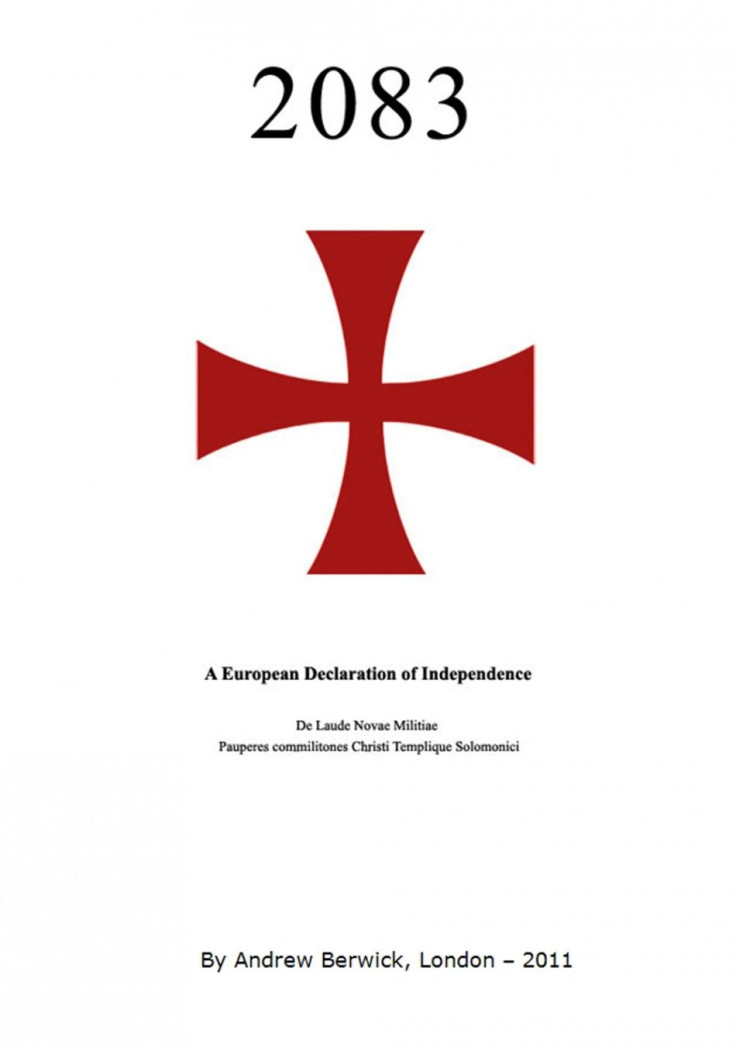Breivik Manifesto: What Does '2083' Mean?

Before Anders Behring Breivik initiated two attacks around Oslo, Norway Friday, he sent out a 1,500 page manifesto titled "2083: A European Declaration of Independence" in which he laid out his plans for a European revolution.
Breivik e-mailed the document to thousands of people hours before he detonated a bomb outside Norway's government headquarters, and then went on a shooting rampage at a Utøya island summer camp, killing 76 people.
"After years of work the first edition of the compendium '2083 – A European Declaration of Independence' is completed. If you have received this book, you are either one of my former 7000 patriotic Facebook friends or you are the friend of one of my FB friends. If you are concerned about the future of Western Europe you will definitely find the information both interesting and highly relevant," Breivik wrote.
Citing a conspiracy to turn Europe into an Islamic empire, Breivik claims in his manifesto to be the first crusader in the war to take back Europe for ethnic Europeans. The often rambling and disjointed tome makes references to a number of historical events, as well as outlines a long and bloodly struggle that will go on for decades.
But what does the year "2083" in the title refer?
Breivik compares his campaign to the Crusades, and he is obsessed with battles between European nations and Islamic forces. He cites the 1683 Battle of Vienna as the last decisive attempt to push Muslims out of Europe, and he commends the joint effort between European nations in the campaign.
During the Battle of Vienna, the Ottoman Empire tried to seize the Austrian city from a group of Catholic nations known as The Holy League. Polish-Lithuanian, Hungarian, Austrian and German forces under the command of Poland's King Jan Sobieski defeated the Islamic Ottomans in a three month-long battle.
In a section labeled "Jihad in the Modern Era," Breivik praises the battle:
"Following its defeat at the walls of Vienna in 1683, Islam entered a period of strategic decline in which it was increasingly dominated by the rising European colonial powers."
But, Breivik notes that the battle did not fully expel Islam from Europe, and that the religion has been prying back control ever since. Breivik, as he repeats over and over, is trying to accomplish what the Battle of Vienna did not.
Furthermore, Breivik has set the year 2083 as the day his civil war will be over
"We must rise and claim what is rightfully ours!" he says. "By September 11th, 2083, the third wave of Jihad will have been repelled and the cultural Marxist/multi-culturalist hegemony in Western Europe will be shattered and lying in ruin, exactly 400 years after we won the battle of Vienna on September 11th, 1683. Europe will once again be governed by patriots."
Breivik lays out a timeline, starting almost a decade ago and extending until 2083, that involves the "creation and growth of the European Federation," future coups d’états and the military medals for a future army.
He is also concerned with the rise of feminism in the 1830s, which somehow corresponds to Barbary pirates and the British empire. Breivik claims that feminism is an example of an ideology highjacked by what he calls "cultural Marxism," one of the conspiratorial forces dominating European society.
"Today, the feminisation of European culture, moving rapidly since the 1960s continues to intensify. Indeed, the present-day radical feminist assault through support for mass Muslim immigration has a political parallel to the their anti-colonial efforts. This current assault is in part a continuation of a century-old effort to destroy traditional European structures, the very foundation of European culture," he writes.
The placement of the numbers eight and three in "1830" was originally thought to be his inspiration for the title, but it is likely little more than a tertiary factor.
The purposed date for the end of the "Eurabian War" would also mark the 100th anniversary of the Hamburg Symposium on the Euro-Arab dialogue of 1983, a dialog between two cultures that Breivik believes to be part of the larger Islamification of Europe. That same year, there was a "civil war" between Christians and Muslims in Lebanon, which he calls "the most significant war, which caused the death of thousands of Christians and expelled them from the Mountain area."
Breivik has been planning his war for almost nine years. He was prepared to be apprehended by police, and was even prepared to be killed during his opening rampage. He is now in an Oslo jail cell, awaiting a trial he already expects to lose. In his mind, Breivik's campaign has just started.
It is only the beginning of a thoroughly planned battle. While many of his predictions seem ridiculous and paranoid, there is at least part that may soon come true. He has already planned his closing statement, should the Norwegian court find him guilty.
"I will be so bold and guarantee you one thing," he writes. "You will lose this European civil war sooner than you imagine. Your regime will fall within 2083 and we, the peoples of Europe, will be free once more. We will be free to determine our own future, free to preserve our traditions and culture, free to secure prosperity and the safe and peaceful existence of our people."
© Copyright IBTimes 2024. All rights reserved.











